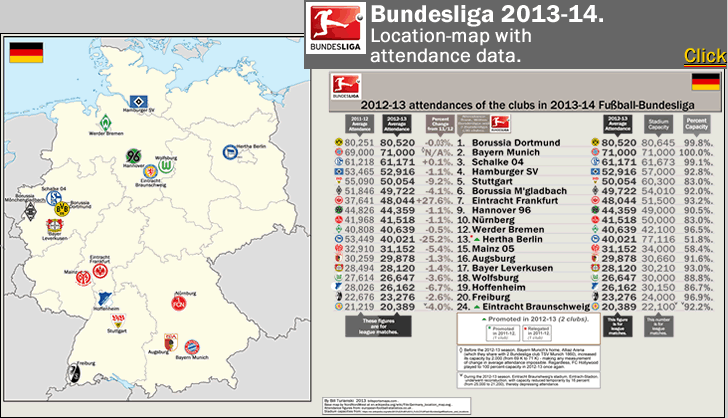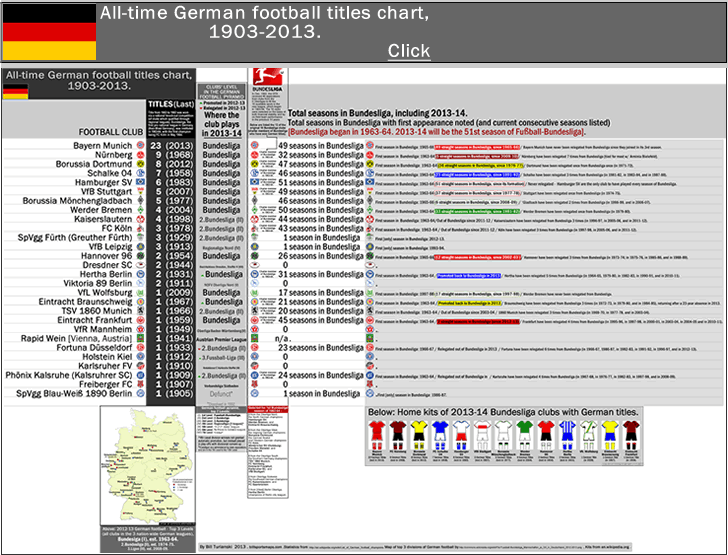Please note:
My latest Bundesliga map-&-post can be found here, category: Germany.]
…

Bundesliga, 2013-14 location-map with 2012-13 attendances
…
…
-
All-time German football titles chart (1903-2013) with title-winning clubs’ total seasons in Bundesliga listed.

All-time German football titles chart (1903-2013) with title-winning clubs’ total seasons in Bundesliga listed
All-time German national titles list, ‘List of German football champions‘ (en.wikipedia.org).
-
Selection process for the clubs which comprised the inaugural season of Bundesliga in 1963-64.
The process considered on-field accomplishment from the past 10 seasons (1954-55 through 1962-63) of the 5 Regionalliga leagues throughout West Germany (East German clubs were finally able to seek access to Bundesliga in 1991). But the selection for the first season of Bundesliga also considered financial situations of the football clubs. First off, the 1963 national champion (Dortmund) was, strangely, not guaranteed direct passage into the new league. However, the 5 winners in 1963 of the 5 regional Oberligen were, pending favorable financial reviews and stadia concerns. So directly placed into Bundesliga were – Hamburger SV (winner of Oberliga Nord in 1963), FC Köln (winner of Oberliga West in 1963), FC Kaiserslautern (winner of Oberliga Südwest in 1963), TSV 1860 Munich (winner of Oberliga Süd in 1963), and Hertha Berlin (winner of Oberliga Berlin in 1963).
An additional condition was that no city could be present with more than one club. Talk about the Teutonic tendency to engineer things! This was not fair at all, and unfairly hurt certain clubs while exempting others. When you consider that the Rhine-Ruhr region in west-central Germany is a de-facto municipality (a mega-city) of its own, one could argue that Rhine-Ruhr clubs got an unfair advantage in the selection process because they were essentially exempt from the just-one-club-from-a-city-rule – because, for example, Schalke and Dortmund (whose stadiums are only about 26 km. or 16 miles apart) are in different municipalities but were then and still are part of the same metropolitan area (Ruhr Metropolitan Region).
The just-one-club-from-a-city-rule really hurt 3 clubs in particular – FC St. Pauli, Bayern Munich and Viktoria Köln. That is because the city of Hamburg was already represented by Hamburger SV; the city of Munich was already represented by TSV 1860 Munich; and the city of Cologne was already represented by FC Köln. One of these 3 clubs rather promptly shook off that obstacle – Bayern Munich finally got into the Bundesliga in its 3rd season in 1966-67, and the rest, as they say, is history, as Bayern Munich (aka FC Hollywood) have gone on to become the most successful German football club (with 23 titles including the 2012-13 title) and are current champions of Europe as well (winning their 5th European title on 25 May 2013 in London over Bundesliga rivals Borussia Dortrmund). But the other two clubs that were snubbed by the just-one-club-from-a-city-rule for that inaugural season of Bundesliga in 1963-64 perhaps never got over that roadblock – FC St. Pauli took a decade-and-a-half to finally get into the Bundesliga (first in 1977-78), and have only spent 8 seasons total in the German top flight (last in 2010-11) and are a chronic financial basket-case; while Viktoria Köln have never made it into the Bundesliga and are currently a 4th division club (note: German divisions within the German football pyramid are listed at the lower center of the chart).
The selection process for the clubs that would comprise the first season of the Bundesliga in 1963-64 also considered financial situations of the football clubs. Furthermore, infrastructural conditions were set forth – a club had to either have a 35,000 seat stadium, or the club has to have in place feasible plans to build a stadium with at least 35,000 seats.
To select the remaining 11 spots in the first season of Bundesliga, the previous 3 seasons of the 5 Oberligen were triple-weighted (1959 to 1963 seasons), while seasons from 4 to 7 years previous were doubled-weighted, and seasons 7 to 10 years previous were single-weighted.
Of the 74 clubs within the 5 Oberligen, 46 applied for the first Bundesliga season. 15 applicants were immediately rejected, including Borussia Möenchengladbach and Bayer Leverkusen.
In January 1963 the following 9 clubs were selected – FC Köln, Borussia Dortmund, Schalke 04, Werder Bremen, Eintracht Frankfurt, FC Nürnberg, Hamburger SV, FC Saarbrücken, and Hertha Berlin. In May 1963, these 7 clubs were selected – SC Preußen Münster, Meidericher SV (now called MSV Duisburg), Eintracht Braunschweig, FC Kaiserslautern, TSV 1860 Munich, VfB Stuttgart, and Karlsruher SC. [Note: at the lower center of the chart are the clubs selected for the first season of Bundesliga, listed by which Oberligen they came from.]
FC Köln were champions of the inaugural season of Bundesliga, finishing 8 points ahead of Meidericher SV (current third division club MSV Duisburg). Relegated that first season of Bundesliga were SC Preußen Münster (who never made it back to the top flight and are currently a 3rd division club) and FC Saarbrücken (who probably should never have been selected to be a charter member of Bundesliga [see below], and have only spent 5 seasons in the Bundesliga, last in 1992-93, and are also currently a 3rd division club). Here is an excerpt from Saarbrücken’s page at en.wikipedia.org, …’Saarbrücken’s selection to the new league was arguably the most controversial as the club’s recent record was not as good as their divisional rivals Neunkirchen, FK Pirmasens and Wormatia Worms. The belief is that their advantage lay in the fact that the club had a long association with Hermann Neuberger, an extremely influential figure in German football – and a member of the selection committee’. …{end of excerpt}.
Here is the en.wikipedia page on the first Bundesliga season, with a map that shows the geographic spread of the clubs, ‘1963–64 Bundesliga‘ (en.wikipedia.org). Note how similar that first Bundesliga season’s geographic spread of clubs is to the present-day geographic spread of current Bundesliga clubs. There are 8 clubs in the 2013-14 Bundesliga that were selected for the first season of Bundesliga 51 years ago (including both of the just-promoted clubs) – Borussia Dortmund, Eintracht Braunschweig, Eintracht Frankfurt, Hamburger SV, Hertha Berlin, Schalke 04, VfB Stuttgart, and Werder Bremen.
___
Base map for Bundesliga location-map from http://en.wikipedia.org/wiki/File:Germany_location_map.svg; thanks to NordNordWest for drawing that map.
Thanks to Europrean Football Statistics for the 2012-13 and 2011-12 attendance figures, http://www.european-football-statistics.co.uk/attn.htm.
Thanks to the contributors to the pages at en.wikipedia.org, https://en.wikipedia.org/wiki/2012%E2%80%9313_Fu%C3%9Fball-Bundesliga#Stadiums_and_locations.
Map in chart (2012-13 German clubs in top 3 leagues) by Lencer at commons.wikimedia.org/wiki/File:Fussball-Bundesliga_Mannschaften_je_Ort_in_Deutschland_2012-2013.png.
Rapid Wien icon from http://www.skrapid.at/.
Thanks to Lencer at commons.wikimedia.org/wiki/File:Fussball-Bundesliga_Mannschaften_je_Ort_in_Deutschland_2012-2013.png, for the map of 2012-13 Bundesliga/2.Bundesliga/3.Ligen clubs’ locations.
Thanks to the contributors to the pages at de.wikipedia.org and en.wikipedia.org –
http://de.wikipedia.org/wiki/Fu%C3%9Fball-Bundesliga#Geschichte.
http://en.wikipedia.org/wiki/Introduction_of_the_Fu%C3%9Fball-Bundesliga#The_qualifying_process_for_the_Bundesliga.
